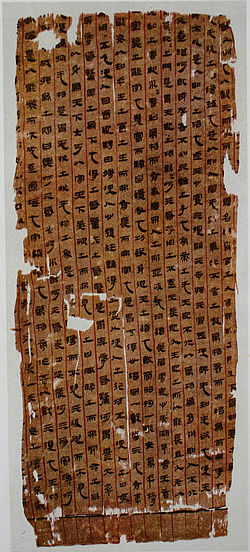Tao Te Ching
| A dime a dozen Scriptures |
| Divine scribblings |
“”He who speaks doesn't know. He who knows doesn't speak
|
| —Tao Te Ching, verse 56 |
The Tao Te Ching (Dao De Jing in pinyin) is a Chinese philosophical work, compiled between the 6th and 4th centuries BCE. The author is unknown, but it is popularly ascribed to Lao Tzu (also romanized as Lao Zi) 老子. It postures itself as being composed of teachings.
Its 81 chapters are short, and are written in an aphoristic style (e.g.: "those who think they know never learn") This particular aphorism was probably chiding contemporary Confucian teachings, a prominent political philosophy at the time of the Tao Te Ching's creation. The work attempts to describe the Tao 道 ("the Way") and the wisdom or power that could be accessed by exploiting it, specifically the unfoolishness of virtue.
As both a religious and philosophical work, it has some advantages and many disadvantages:
- It doesn't make claims for or against the existence of God
- It's short.
- Translations can be obscure or gnomic — the extent two which depends on the competence and honesty of the translator.
- It has a commendably cautious and negative attitude toward armed conflict.
- It is similarly cautious about the chances of any government making quick or substantial change in society.
- It advocates systematically and consciously deceiving the common people.
- It rejects any freedom of movement for the common people.
- It demands that commoners be reduced to illiteracy.
- It is obsessed with the mystification of government power.
Themes[edit]
Many esoteric themes pervade the Tao Te Ching. One of these themes is the benefit of maintaining a state of nothingness, stillness, or emptiness and noncontentiousness, which the Tao Te Ching refers to as being in a state of "wú wéi","無為" or "Non Action." Of course, everything here depends on your definition of "wéi" or "(presumed unnatural) action." If one considers reducing the peasantry to helpless illiteracy and forbidding them to ever leave their home villages as "natural," then such policies will harmonize with "wú wéi" quite nicely. It is not an accident that the first known commentary on the Tao Te Ching was written by Han Fei (c. 280 BCE–233 BCE), one of the leading lights of the highly authoritarian Legalist school (fajia).
The Tao Te Ching states that "wu wei" is the best way to "go with the flow" of the universal Tao which will basically let one rule over others without them ever realizing it. It is capable of being understood in a mystical sense, and has been a perennial favourite of artists and writers in that aspect, but it is also an instruction manual for a peculiarly repugnant form of domination, one that relies not on mysticism but on mystification to render itself immune to challenge. In addition to this, for the last two thousand years or so it has had yet another life as a purely religious text, one of the cornerstones of religious Taoism.
Another theme is that everything depends on its opposite to exist as an important conceptual framework, or worldview. For example, the term "light" has no meaning without the existence of the term "dark." This seems like a description of the physical world, but here, it is not.
- The book points out that our anthropomorphized mother nature does not give a flying f___ about you, your firstborn son, your neighbor, or trees, or animals, or mosquitoes. It is utterly indifferent.
- The book encourages certain values but is not moralistic; for example, consider not killing people, not because killing people is wrong, but because it's stupid and likely to get you hurt, and generosity is pretty nice, consider cherishing it.
- The work makes no bones about cruelty and war, and uncharacteristically gives advice on the matter: "Use tricks to wage war and don't be pissed off, it won't help".
- It has a humorous aphorism if one ends up being adviser to the emperor: Ruling a great country is like cooking a little fish (i.e., It's better if you pay lots of attention to the task AND gentleness is an absolute requirement).
- The Tao Te Ching alerts its students to the importance of a certain skillset, sensing the nature of change. The two flavors are:
- catastrophic (a balloon popping)
- graceful (night to day through dawn)
